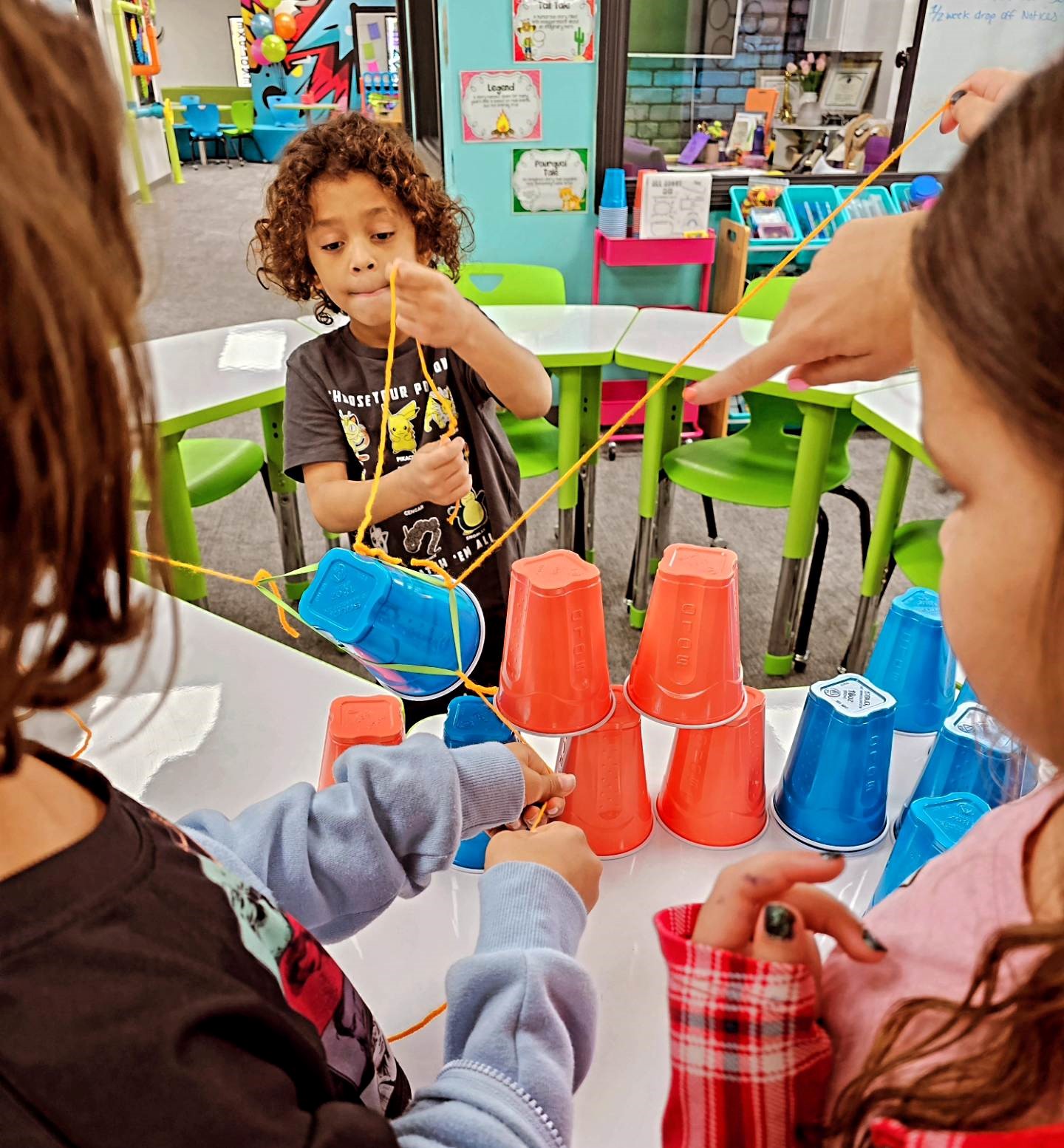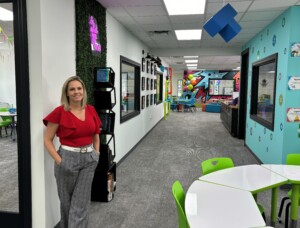PALM BEACH GARDENS, Fla. – Cristina Bedgood, a 15-year former public school teacher, took two years to craft plans for her own private learning center. She knew she needed 40 students in year one to make it work. But in April, when she held her first open house for Curious Innovators of America, she looked out the front door five minutes before the start time and saw … nobody.
 Her heart sank.
Her heart sank.
Thankfully, it floated right back up, because in the next few minutes, 30 families appeared. “And every person who walked in the building said, ‘Oh my God, we need this! ‘ ”
The calls keep coming. Bedgood signed up 10 students on one day in August alone. Most of them use state-supported education savings accounts.
Bedgood said the response has been gratifying – and going her own way as a teacher, liberating.
“I needed to be able to break free. I felt like I was being caged,” Bedgood said, referring to traditional schools. “I knew I could do so much, but I was being limited.”
In Florida, a national leader in expanding education choice, it’s tough to keep up with the growing ranks of former public school teachers who are leveraging choice programs to create their own options.
Bedgood said she came to realize she could help more students by creating her own model – in this case, a K-8 tutoring center focused on math, reading, and enrichment that caters to a wide range of students with a wide range of schedules.
She didn’t come to this conclusion lightly.
Bedgood was the instructional coach at a high-poverty, public elementary school for six years. She found the work “exhilarating.” But she also began to have doubts about the best path forward.
Bedgood said she was effective in part because she had a principal who gave her the freedom to veer from district dictates; to “go rogue” when she thought she needed to. Bedgood said she re-ordered and re-focused some parts of the curriculum, doubled down on others, and better aligned it to state standards. She leaned into response boards for formative assessments. She made widespread use of manipulatives that previously were gathering dust.
Her approach worked. The school’s state-issued grade gradually rose from a D to an A. Math proficiency rose from 47 percent to 72 percent.
But Bedgood said she also saw that principals like hers were rare. And that not everybody had high expectations for high-poverty students.
“I knew it. I watched it. I saw kids who were Level 1’s (the lowest level on Florida’s standardized tests) shoot up to proficiency,” she said. And yet, in some places, “the climate was almost like, ‘These kids can’t do it.’ “
Bedgood asked herself: If I rose through the ranks, would I truly be in position to do what works?
Ultimately, she concluded, there was a good chance she wouldn’t be. So, she looked for the exit. She overcame fears about starting her own operation; persuaded her husband, a firefighter; consulted with experts, including other teachers; and found a good location without too much hassle.
 Bedgood describes Curious Innovators as a tutoring center and microschool. She opened in April with two students: Her own kids.
Bedgood describes Curious Innovators as a tutoring center and microschool. She opened in April with two students: Her own kids.
The center is 4,200 square feet, in a trim office building framed by oaks and palms. The interior is colorful and comfortable, with giant, geometric puzzle pieces hanging from the ceiling, all of it designed to stimulate creativity. There are separate rooms for reading, math, and STEM, and multiple stations for students to collaborate.
Bedgood employs five instructors, three of them full time. Two are former public school teachers.
All the students are homeschooled.
Some need tutoring in reading and/or math. Some are there for enrichment. Some mix and match from both. Bedgood emphasizes project-based and inquiry-based learning, but each student’s programming is created in tandem with them and their parents.
Reading and math classes are offered three days a week. Enrichment classes include art, music, drama, debate, creative writing, STEM, and entrepreneurship.
Maria Tobon signed up her daughter and son for math, reading, and science this fall after getting to know Curious Innovators during a three-week summer program. They attend full days on Mondays and Fridays.
One of her children uses Florida’s Family Empowerment Scholarship for Students with Unique Abilities. The other uses a Personalized Education Program scholarship. Both are administered by Step Up For Students.
“The beauty of a tutoring program like Cristina has built is you can hand pick what you need,” said Tobon, a former Montessori teacher who manages a homeschool co-op.
Tobon said between all her children, she has experienced a full gamut of educational options, from traditional public schools to magnet, charter, and private schools. She decided to homeschool after one of her children was diagnosed with cancer, and the COVID-19 pandemic made traditional schooling too risky.
Homeschooling, she said, turned out to be “absolutely mind-blowing.”
“When I took control … they grew in every sense,” Tobon said. “Going back to a full-time program sounds like jail.”
Kristen Collins wanted part-time schooling for her children, too. Her husband travels a lot for work, and homeschooling allows the family to occasionally join him, without missing a beat educationally.
Bryson, 6, and Aaliyah, 8, both use PEP scholarships. They attend Curious Innovators full days on Tuesdays, Wednesdays, and Thursdays.
“It’s just a great happy medium,” Collins said. And her kids “don’t want to leave. They’re having a blast.”
In some ways, Bedgood’s approach to teaching and learning is mainstream.
She follows the “science of reading” for younger students and struggling readers. She uses standardized tests to gauge proficiency. She tends to follow the grade-level progressions laid out in state standards.
The difference is, she has the flexibility to deviate from those tools, or supplement them, in any way she and the parents see fit.
Collins said that approach is working for Aaliyah, who has struggled a bit in math.
“Cristina recognizes that students learn differently, with different modalities. It’s not one size fits all,” she said. Aaliyah “has only been there two and a half weeks, but I can see she’s getting to these higher levels.”
After experiencing what’s possible outside traditional schools, Bedgood said she couldn’t go back.
Giving parents and teachers options, she said, is the best path to progress.
“I want choice to be the primary form of education,” she said. “The change needs to come from out of the system.”